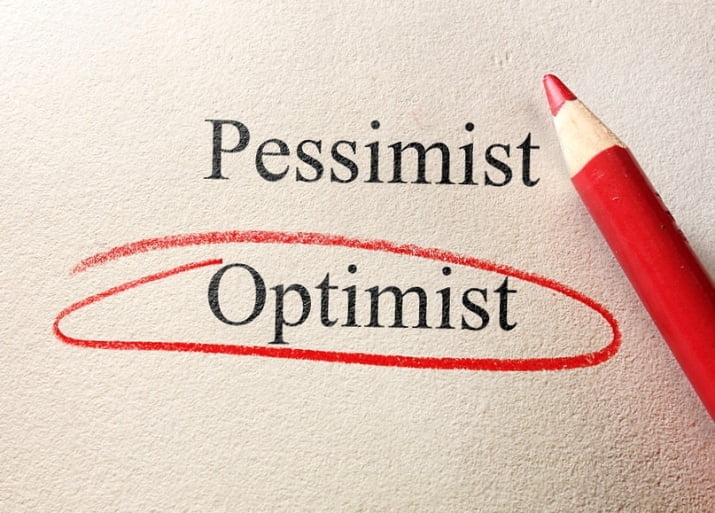September 14, 2021 - By: Brandon Jenkins
The greatest discovery of any generation is that a human can alter his life by altering his attitude.”
—William James, American philosopher and psychologist

We tend to believe that certain conditions must be met in order for us to be truly happy: We’ll be happier when we have more money, when we move into our next home, when we find a new mate, or when we lose 20 pounds.
But the latest research says we’ve got it backwards.
When it comes to wealth, the age-old debate asks: “Will money make you happy?” Implied is a further question, “If so, how much money is required for a certain level of happiness?” (You’ll find both questions and answers addressed in an article on ProsperityPeaks.com: “Money and Happiness: The Surprising Research.”)
But perhaps… we’ve been asking the wrong question. Perhaps we should be asking which is cause and which is effect. It’s the old, “Which comes first, the chicken or the egg?” debate. Or rather, “Will success result in greater happiness, or does happiness bring about greater success— including financial success?”
Shawn Achor, a leading positive psychologist and former Harvard professor, asked how being happy first might make people more successful as a result. When we begin with happiness, we’re actually more likely to end up with the success we mistakenly thought was a prerequisite for happiness.
Author of The Happiness Advantage: The Seven Principles of Positive Psychology that Fuel Success and Performance at Work, Achor has tested his research on students at Harvard, in impoverished schools in Africa, with Fortune 500 companies, on children in cancer wards, and in the slums of Venezuela. And no matter the setting, he found that re-wiring our brains for happiness with simple but effective habits leads to measurable success. And whether you are an employee, an employer, or an entrepreneur looking to raise your results, Achor’s conclusions can impact your success.
The Productivity Advantage
If you want to be more productive and profitable (or wish the same for your employees), take note. As Achor reported in a Harvard Business Review article, “The Happiness Dividend,” a decade of research proves that happiness raises a wide range of business and personal outcomes:
- Sales soar by 37%
- Productivity increase by 31%
- Employees are 40% more likely to be promoted
- People have 23% greater energy in the midst of stress, and
- Accuracy on tasks improves by 19%.
Simply put, happy brains are more productive brains. Achor’s research shows that when your brain is happy, it “performs significantly better than it does at negative, neutral, or stressed. Your intelligence rises, your creativity rises, [and] your energy levels rise.” Additionally, health improves, job satisfaction increases, and longevity is extended… dramatically.
Watch Achor’s hilarious and inspiring TED talk: (It’s 13 minutes and well-worth it!)
https://www.youtube.com/watch?v=fLJsdqxnZb0
Digging beyond the TED talk, three striking studies cited by Achor in his research include:
Positive Top Producers. In one study conducted by University of Pennsylvania professor Martin Seligman, considered the father of positive psychology, it was discovered that “the top 10 percent of optimists at MetLife Inc. outsold the other 90 percent by 90 percent,” according to Workforce.com. MetLife then hired for a positive mindset. The result? “The new agents outsold their more pessimistic counterparts by 21 percent the next year and by 57 percent the following year.”
Success and Satisfaction. Just before a stressful Great Recession tax season several years ago, Achor did a three-hour intervention with tax managers at a New York/New Jersey accounting firm. Half of the managers attended Achor’s training on changing your lens to a more positive one. Not only did they subsequently report increased optimism and satisfaction, but they sustained improvements through tax season. Four months later, those who received the training reported a 24% improvement in job and life satisfaction, compared with their peers who received no training.
Quality and length of life. A group of 180 elderly Catholic nuns were asked to document their thoughts in diaries. The nuns whose journal entries had more overtly joyful content lived nearly 10 years longer than those whose entries were more negative or neutral! Additionally, practicing the happy habits (below) has been proven to lower blood pressure and improve many other health markers.

Breaking the Negativity Addiction
Do you catch yourself frequently complaining? Do you wake up every morning and scan the news to see what terrible thing might be happening in the world? (Granted, you might also be hoping for wonderful news about peace and prosperity, but let’s face it, news is 90% negative because that’s what we tend to pay attention to, according to BigThink.com)
“Constantly scanning the world for the negative comes with a great cost. It undercuts our creativity, raises our stress levels, and lowers our motivation and ability to accomplish goals,” posits Shawn in The Happiness Advantage.
If you want to be more successful, breaking the negativity addiction is a must. And while Achor gives concrete positive habits to practice, there are also habits you can let go of to give yourself a “happier” brain. News in the morning is one. Just three minutes of negative news in the morning can reduce your effectiveness at work. Complaining is another. Worry, fear, and impossible expectations of yourself that leave you constantly in “the gap,” as my mentor Dan Sullivan would call it—focusing on all the ways you are falling short instead of how far you’ve come—also won’t serve you.
So how do you raise your mood and train your brain to be happy? It’s all about changing your behavior in simple, effective, measurable ways, for instance, by practicing gratitude on a daily basis. Positive psychology shows that while our happiness can be influenced by genetics, conditioning, and circumstances, your mindset and habits are far more predictive of happiness. By controlling how you view the world and habitually respond to situations, you can re-wire yourself for happiness.
Even when it comes to clinical depression, research shows that behavior and habits matter. Even simply believing that behavior matters gives a depressed person more power to overcome the challenge of depression. “It’s very difficult for the brain to be depressed and grateful at the same time,” Achor shared in a Big Think video.
If you’re someone who tends to notice the negative first, don’t despair! The good news is that you can retrain your brain with simple habits in as little as three weeks.

Five Happy Habits
“Habits are like financial capital – forming one today is an investment that will automatically give out returns for years to come,” says Achor in The Happiness Advantage.
Achor researched what habits would lead us to a happier, more productive brain, documenting the habits that lead us to become “positive in the present,” rather than simply aiming for the achievement of goals that we believe will make us happy “someday” in the future. Achor recommends practicing these five simple habits daily:
1. Recall three things you’re grateful for. To re-train your brain to scan for the positive first, write down three NEW things that you are grateful for every day. (I write gratitudes every morning before I start my workday.)
2. Journal about a positive experience. Also daily, recall a recent positive experience and journal about it for two minutes. This allows your brain to relive and reinforce positive .
3. Exercise. Engaging in 15 minutes of cardio activity daily will help you focus better. Exercise also “teaches your brain that behavior matters,” as you’ll notice concrete results.
4. Meditate. Be still and observe your breath go in and out for two minutes a day. Achor explains that meditation “allows your brain to get over the cultural ADHD that we’ve been creating by trying to do multiple tasks at once (and) focus on the task at hand.”
5. Engage in random acts of kindness. Write a thank-you note or a complimentary email to someone you admire, or perform a simple favor you weren’t asked to do. You’ll be happy you did!
Practicing these habits for 21 days in a row can actually rewire your brain for greater optimism and success. Happiness “turns on all of the learning centers in your brain, allowing you to adapt to the world in a different way,” says Achor.
If it all sounds a little “pie in the sky,” well, it’s not. “Focusing on the good isn’t just about overcoming our inner grump to see the glass half full,” writes Achor in The Happiness Advantage. “It’s about opening our minds to the ideas and opportunities that will help us be more productive, effective, and successful at work and in life.” Achor affirms that the best leaders are those who can thrive in times of stress and struggle, not those who pretend that challenges don’t exist.
Your Happiness Advantage
If you’re ready to up-level your productivity and profitability, we invite you to start practicing the 5 habits above. One of Prosperity Economics’ 7 Principles of Prosperity™ is to THINK from a Prosperous Mindset, and we believe that gratitude is an essential part of that. It has been said that “Gratitude and scarcity cannot co-exist in your mind,” and we agree with that statement wholeheartedly! Give yourself the happiness advantage and don’t be surprised if greater health and wealth follow.
Need positive help with your finances? Our financial philosophy isn’t based on scarcity or luck, it’s based on timeless principles and proven financial vehicles and strategies that won’t have you lying awake at night worrying about the economy! We assist people with growing, protecting, and passing their wealth, also tax reduction, maximizing cash flow, utilizing the living benefits of life insurance, creating self-directed IRAs that won’t roller coaster ride with the market, and more. Reach out to us; we’re happy to help!
© Prosperity Economics Movement
